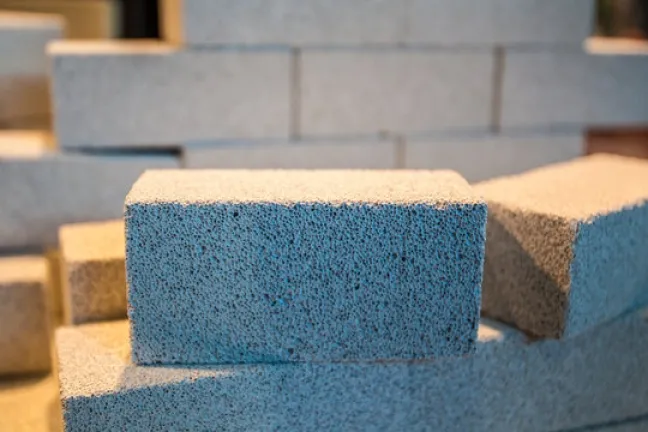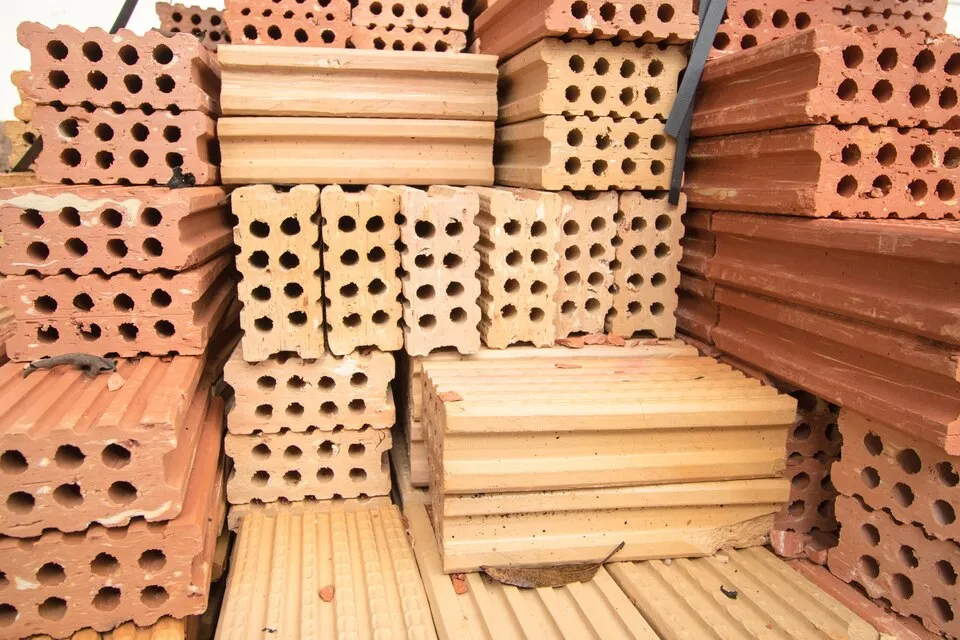The materials used for the construction of a structure determine the strength and quality of that structure.
The history of construction materials dates back to when primitive men used the available twigs and stones to build homes to protect themselves from wildlife. Now, as the world has progressed, the materials used for construction have come a long way.
The variety of construction materials available in today’s market will make you capable of designing the building you desire.
In this article, we list 14 building construction materials of different qualities. When you design a building next time, this article will help you decide what material to choose from the vast sea of construction materials available in the market.
Essential Building Construction Materials
1. TMT Steel Bars

Thermo Mechanically Treated Steel Bars (TMT Steel Bars are strong steel bars used to build the structure of buildings.
They offer a great combination of malleability and ductility for buildings and provide protection even during seismic activities.
TMT Steel Bars are available in different grades like Fe 500, Fe 550, Fe 550D, Fe 550 XD, and more, and all vary in strength, flexibility, and elongation properties.
Advantages of TMT Steel Bars
- High tensile strength, making them suitable for heavy building structures
- Can withstand harsh environmental conditions
- Excellent resistance to corrosion
- Impressive weldability and bendability
- Superior ductility, allowing structures to resist earthquakes
- Highly cost-effective because they require less maintenance and replacement over time.
- Good thermal resistance, making them suitable for high-tempered areas.
Applications of TMT Steel Bars
- Structural framework of buildings
- Bridges
- Dams
- Industrial structures
- Highways and flyovers
- Earthquake-prone areas
- Underground structures like metro stations and tunnels
2. Aerated Concrete

Aerated concrete is a lightweight precast concrete building material. It is made by introducing air into a slurry composed of Portland cement and fine aggregate.
It is manufactured in factories where it is moulded into blocks ready to be used for masonry.
These blocks contain about 80% of the air. Hence they are 80% less in weight than conventional concrete blocks.
Advantages of Aerated Concrete
- Significantly lighter than traditional concrete
- Provides excellent thermal insulation
- Highly fire-resistant
- Offers good sound insulation
- Reduces energy costs associated with heating and cooling.
- Uses less raw material and energy
Applications of Aerated Concrete
- Interior and exterior walls
- Floors and roofs
- Firewalls
- Sound barriers
- Prefabricated panel
Also read: 7 Advanced Construction Techniques
3. Compressed Stabilized Earth Blocks (CSEB)

Compressed Stabilized Earth Blocks (CSEB) are building blocks made of soil, aggregate, and water and stabilized with Portland cement or lime.
It is made by mixing all the components mechanically pressing them in a steel press, and then laying them out to dry.
Advantages of CSEB
- Made from locally available materials like soil, reducing the environmental impact.
- Cheaper than many traditional building materials
- Highly durable and can withstand harsh weather conditions.
- Excellent thermal insulation properties
- Extremely versatile
- Easy to handle and build with
- Emits significantly less carbon dioxide during production
- Require minimal maintenance over time.
Applications of CSEB
- Residential Buildings
- Commercial Buildings
- Retaining Walls
- Schools and Community Centers
- Eco-Tourism Facilities
4. Bamboo

Bamboo is one of the most underrated, robust, and versatile materials in the world. It has been used for decades to build everything from homes to bridges.
In recent years, bamboo has become a popular choice for construction due to its many benefits.
Bamboo is strong, sustainable, and stylish. It is also an excellent choice for construction because it is easy to work with and install.
Advantages of Bamboo
- A sustainable and renewable source of construction material
- Has high tensile strength
- Provides excellent flexibility
- Cheaper when compared with other traditional materials like wood
- Absorbs carbon dioxide as it grows, helping to reduce greenhouse gas emissions
- Can last for many years
- It’s lightweight and, hence, easy to transport and handle
- Provides natural insulation
- Can decompose naturally, reducing waste and environmental impact
Applications of Bamboo
- Residential Buildings
- Scaffolding
- Small to Medium-sized Bridges
- Furniture
- Flooring
- Roofing
- Wall Panels
- Fencing
- Eco-tourism facilities
- Garden Structures
5. Glass

As you know, Glass is a very versatile material with a range of benefits for construction. It is solid and durable, making it an ideal material for windows and doors.
In modern construction, glass is one of the widely chosen materials since it provides superb utility and helps in uplifting the aesthetics of a building.
Advantages of Glass
- Allows natural light to penetrate buildings
- Enhances the aesthetic appeal of a building
- Available in various types, colours, and textures
- Certain types of glass, like double-glazed or low-E glass, offer excellent thermal insulation
- Acoustic glass can provide effective sound insulation
- Can last for years without losing its aesthetic appeal if maintained well.
- Easy to clean and maintain
- Some types of glass can be recycled
- Tinted or reflective glass can help control solar heat gain
Applications of Glass
- Building Facades
- Windows
- Doors
- Partitions
- Skylights
- Flooring
- Display Cases
- Aquariums
6. Bricks

Bricks are another material that’s one of the most seen in the construction industry.
It’s also one of the oldest and most traditional construction materials, valued for its durability, strength, and thermal properties.
Advantages of Bricks
- Long-lasting durability
- It’s fire-resistant and can help to prevent the spread of fires
- Excellent thermal insulation properties
- Good sound insulation
- Requires very little maintenance over time
- Offer timeless aesthetics
- Can often be recycled at the end of their life
- Not susceptible to termites or other pests.
- Can withstand extreme weather conditions
- Available in a variety of colours and finishes
Applications of Bricks
- Residential Buildings
- Commercial Buildings
- Retaining Walls
- Pavements and Pathways
- Fireplaces and Chimneys
- Garden Walls
- Historical Restoration
7. Cement

Cement is a binding material used in conjunction with aggregates to create concrete, one of the most fundamental materials in construction.
Advantages of Cement
- Serves as a strong binding agent that holds other construction materials together
- You can use it in a variety of applications
- They have long-lasting durability and resistance to wear and tear
- Highly fire-resistant
- Can withstand heavy rain, extreme heat, and freezing temperatures
- High compressive strength
- Low maintenance
- Have good resistance to most common chemicals
Applications of Cement
- Foundations
- Walls
- Floors
- Roads
- Bridges
- Dams
- Paving
- Retaining Walls
- Concrete Slabs
Also read: Types of Slabs in Construction
8. Wood

Here is yet another one of the most seen and heard construction materials.
Needless to say, wood is a natural and versatile material that has been used in construction since ancient times.
Advantages of Wood
- It’s a renewable resource
- Can be cut and shaped into numerous sizes and styles
- Has a natural beauty that can enhance the aesthetic appeal
- Has natural insulation properties
- Provides excellent structural strength
- Has good sound absorption properties
- Helps absorb CO2 from the atmosphere
- It can decompose naturally, reducing waste and environmental impact
Applications of Wood
- Furniture
- Flooring
- Roofing
- Decks and Patios
- Fencing
- Scaffolding
- Doors and Windows
- Boat Building
- Cabinetry
9. Clay

Clay is another natural material that’s been used in construction for centuries, particularly in the form of bricks and tiles.
Advantages of Clay
- It’s a naturally occurring material
- Has excellent thermal properties
- Can last long
- Highly fire-resistant
- Easy and low maintenance over time
- Provides good sound insulation
- Offers a natural aesthetic that can enhance the visual appeal of a building
- Can suck out moisture
Applications of Clay
- Bricks
- Tiles
- Sculptures
- Insulation
- Fireplaces and Ovens
- Landscaping
10. Coarse Aggregates

Coarse aggregates are materials like gravel or crushed stone that are used with a binder such as cement or bitumen to form concrete or asphalt respectively.
Advantages of Coarse Aggregates
- Contribute to the strength of concrete and asphalt
- They are highly durable and resistant to weathering
- They are widely available
- Provide stability to roads and prevent deformation under heavy traffic
- Have good thermal insulation properties, which can help regulate temperature within a structure
- They can absorb sound, contributing to noise reduction in construction
Applications of Coarse Aggregates
- Concrete Production
- Road Construction
- Building Foundations
- Landscaping
- Drainage Systems
- Bridges and Dams
11. Metal Sheets

Metal sheets, made from materials like steel, aluminium, or copper, are versatile construction materials.
Advantages of Metal Sheets
- Highly durable and resistant to many forms of damage
- Used widely from roofing to siding
- Requires little maintenance
- It’s non-combustible and highly fire-resistant
- Can withstand heavy rain, strong winds, and extreme temperatures.
- It’s highly recyclable
- Relatively lightweight compared to other materials
- High strength-to-weight ratio
Applications of Metal Sheets
- Roofing
- Siding
- Interior Walls
- Ceilings
- Fencing
- Facades
- Solar Panels
12. Gypsum Board

Gypsum board, commonly known as drywall, is a lightweight, fire-resistant panel used primarily for interior walls and ceilings.
Advantages of Gypsum Board
- Its lightweight nature makes it easy to install
- Can help slow the spread of fires
- Helps reduce noise transfer between rooms
- Provides a smooth, seamless surface ideal for painting, wallpapering, or other finishing treatments
- Comes in various sizes and types to suit different needs
- Its insulating properties can help improve a building’s energy efficiency
Applications of Gypsum Board
- Interior Walls
- Ceilings
- Partitions
- Soundproofing
- Fire-Rated Walls
13. Tiles

Tiles are a versatile and durable material commonly used for flooring, walls, and other surfaces, known for their easy maintenance, variety of designs, and resistance to moisture.
Advantages of Tiles
- Highly durable and can withstand heavy foot traffic
- Easy to clean and maintain
- Resistant to water and humidity
- Available in different styles and textures
- Can last for many years without needing replacement
- If one tile incurs damage, you can simply replace it with another one
Applications of Tiles
- Flooring
- Walls
- Backsplashes
- Countertops
- Shower walls
- Outdoor Spaces
14. Stone

Stone is a naturally occurring, durable material used in construction for various purposes such as building walls, paving, and decorative elements due to its aesthetic appeal, strength, and longevity.
Advantages of Stone
- Extremely durable, and hence ideal for exterior applications
- Can enhance the visual appeal of any building or landscape
- Offers a wide range of design possibilities
- Excellent compressive strength
- Resistant to damage from pests and rot
- Stone is non-combustible and highly fire-resistant
- Can absorb heat during the day and release it at night
Applications of Stone
- Building Construction
- Paving
- Retaining Walls:
- Landscaping
- Fireplaces
- Monuments
- Flooring
Conclusion
The choice of construction materials can significantly influence the durability, aesthetic appeal, cost-effectiveness, and environmental impact of a building project. Materials like TMT steel bars, bricks, cement, wood, clay, coarse aggregates, metal sheets, gypsum board, tiles, and stone each offer unique advantages and can be used in a variety of applications. From residential and commercial buildings to roads, bridges, and decorative features, these materials play a crucial role in shaping our built environment.